John Hurrell – 6 January, 2015
Cleland presents single works where most expand on the exhibition's title, either through reference to the unravelling of planet earth itself (Kum, Mangan), the undoing of art's materiality and physical structures (the Mangano twins, Frater, Armanious, Rauschenberg, Lundberg), the possible unpicking of metaphysical realities (Crooks, Barber, Mitchell, Creed, Wealleans, Howden-Chapman), or the collapsing of syntactical processes of communication (Robinson, Speers, Clemens, Stockholder, Hinkley).
Auckland
Works from the Chartwell Collection
A World Undone
Curated by Stephen Cleland
8 November 2014 - 6 April 2015
For this new presentation of Chartwell acquisitions, Stephen Cleland (currently performing contemporary art curator Natasha Conland’s duties while she is away on maternity leave) has organised the selection and installation, one that has quite a different feel from say, Conland’s own Made Active, presented two years ago. That exhibition was dominated by Daniel Malone’s spectacular Black Market Next to My Name installation and had a strong performance component. This one has no performance component and is, I would argue, dominated by three extraordinary Australian videos (they collectively provide a coherent unit), and the design of a large unpainted exhibition plinth by staff member Jason Lindsay; devoid of function as a support structure for other artworks, it would be an impressive sculpture in its own right.
Whereas Conland had groups (or a series) of works for some artists (Jim Allen, Campbell Patterson, and Allen Maddox) Cleland has extremely varied single works where most expand on the show’s title, either through (often tangential) reference to the unravelling of planet earth itself (Kum, Mangan), the undoing of art’s materiality and physical structures (the Mangano twins, Frater, Armanious, Rauschenberg, Lundberg), the possible unpicking of metaphysical realities (Crooks, Barber, Mitchell, Creed, Wealleans, Howden-Chapman), or the collapsing of syntactical processes of communication (Robinson, Speers, Clemens, Stockholder, Hinkley). Some items slot into several categories; others none at all.
The key work in this exhibition seems to be Daniel Crooks‘ characteristically mesmerising An Embroidery of Voids - even though the show’s title comes from Nicholas Mangan‘s video, his neighbour in the installation. Usually Crooks examines motion through the activity of slowmoving figures but this time he exploits the steady movement of the camera through narrow lanes or alley-ways filmed in inner Melbourne. The spellbinding telescopic structure (a spatial sliding effect of sequentially entered ‘planes’) of his digital ‘time slices’ creates such a powerful presence that it seems also reflected in the installation of Andrew Barber’s The Sea (via its resulting, enterable and boxlike, gallery sides), the composition of John Baldessari’s Learn to Dream (its beguiling Churchward font and swapped around hues), and the cyclic to-and-fro movement of Dan Flavin’s four sided coloured tondo screened onto glass windows.
With the sculpture and paintings in the adjacent white walled gallery, the rippled Andrew Barber floor is so dominant that there is a sense of the curator taking on the role of artist and using other artists as his raw materials which he clusters together. This sort of curatorial model has been prevalent for a couple of decades now but wonderful wall-leaning and freestanding works in this show like those of Stockholder and Armanious do suffer. Barber’s floor is too overpowering to share with others.
A related problem occurs with the works on paper edition works and small sculpture placed on Jason Lindsay’s beautiful mdf plinth, a work that seems to allude to Judd sculpture, Schwitters’ architectural modifications, and constructivist composition. Yet the alternative to these curator-constructed ‘identity-sandwiches’ is having work tidily lined up in isolation on white gallery walls or plain floors, and what Cleland and Lindsay have done - being overall refreshingly energising - clearly is preferable as a presentation. It is a surprising stimulant where the viewer is also challenged to mentally imagine some of the artworks in an ‘uncontaminated’ context.
There are similar issues with the subtly decorative, marble-chipped, gallery floor beyond Barber, for a work like that of Richard Frater‘s rectangle of scattered nails - with their separated stems, heads and tips - ideally needs a plain concrete base. But the work in this ‘collaboration’ with the building’s architects (FJMT/Archimedia) still impressively succeeds, as do the two nearby ‘cut wall’ paintings of his Centre for Art colleague, Patrick Lundberg. However this can’t be said for the Peter Robinson’s Ritual and Formation on the end wall. Brilliant when originally shown in Hopkinson Mossman where the gallery wall descends directly to the floor - allowing Robinson’s vertical and scattered components to optically mingle - here in Auckland Art Gallery, a low shadowy trough destroys any possibility of ‘haze’, limiting the work’s interpretation to information coding processes and not dematerialising atrophy.
For all my quibbles there is an awful lot to enjoy in this rich diet of New Zealand, Australian, American and European art that the Chartwell Trust has so generously acquired for long-term loan. Some of Cleland’s selections don’t fit into the exhibition theme (Forg, Schoon), but are rivetting anyway (Hipkins, the Bechers, Tuttle, Marclay). The accompanying elegant catalogue (designed by Jessica Gommers) is a treat - presenting informative contributions (two general essays and commentaries on individual works) from eight different writers - while for those of an insatiably curious disposition, the exhibition itself will sustain many repeated visits.
John Hurrell
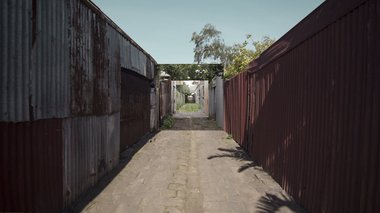
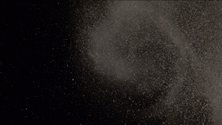
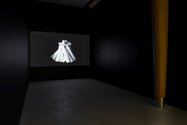
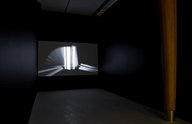
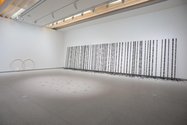
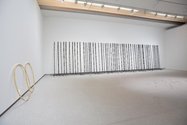
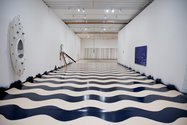
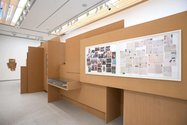
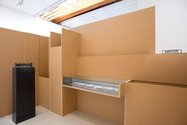
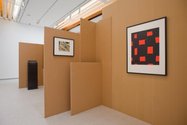
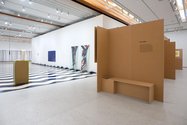
 Advertising in this column
Advertising in this column Two Rooms presents a program of residencies and projects
Two Rooms presents a program of residencies and projects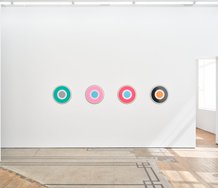
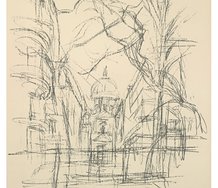
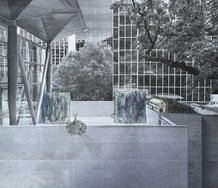
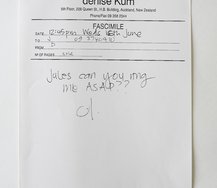
This Discussion has 0 comments.
Comment
Participate
Register to Participate.
Sign in
Sign in to an existing account.